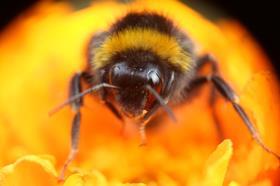
Bumblebees acquire a taste for neonicotinoids in a similar way to a person becoming addicted to nicotine, scientists say.
A study of bumblebee behaviour by researchers at Imperial College London indicates that the risk of pesticide-contaminated food entering bee colonies may be higher than previously thought, which can impact on bees' reproductive success.
A team of scientists from Imperial College London and Queen Mary University of London have shown that bumblebees acquire a taste for neonicotinoids the more they are exposed to them, displaying certain symptoms of addictive behaviour.
In the study, bumblebee colonies increasingly fed on pesticide-laced food over time – a potentially worrying discovery given that the chemicals are thought to affect the central nervous system of insects, resulting in paralysis and death. Neonicotinoids are currently one of the most widely used classes of pesticides worldwide, despite the near-total ban in the EU.
Lead researcherDr Richard Gill, from theDepartment of Life Sciences at Imperial, said: “Given a choice, naïve bees appear to avoid neonicotinoid-treated food. However, as individual bees increasingly experience the treated food, they develop a preference for it.
“Interestingly, neonicotinoids target nerve receptors in insects that are similar to receptors targeted by nicotine in mammals. Our findings that bumblebees acquire a taste for neonicotinoids ticks certain symptoms of addictive behaviour, which is intriguing given the addictive properties of nicotine on humans, although more research is needed to determine this in bees.”
In the study, the team tracked ten bumblebee colonies over ten days, giving each colony access to its own foraging arena in which bees could choose feeders that did or did not contain a neonicotinoid.
They found that while the bees preferred the pesticide-free food to begin with, over time they fed on the pesticide-laced food more and visited the pesticide-free food less.
They continued to prefer the pesticide-laced food even when the positions of the feeders were changed, suggesting they can detect the pesticide inside the food.
Lead author of the research,Dr Andres Arce, said: “Many studies on neonicotinoids feed bees exclusively with pesticide-laden food, but in reality, wild bees have a choice of where to feed. We wanted to know if the bees could detect the pesticides and eventually learn to avoid them by feeding on the uncontaminated food we were offering.
“We now need to conduct further studies to try and understand the mechanism behind why they acquire this preference.”



